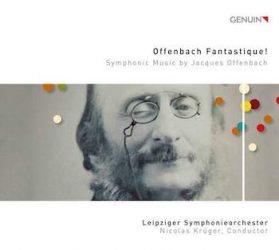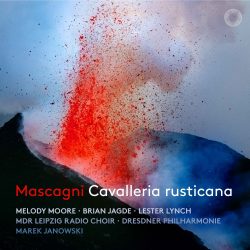Classical CD Reviews: Offenbach Fantastique!, Mascagni’s “Cavalleria rusticana,”and Rossini Project vol. 2
By Jonathan Blumhofer
More proof that Offenbach’s is a remarkable body of work; a serviceable, but not particularly notable, Cavalleria rusticana; another installment in the Rossini Project, brilliantly curated, stirringly played and sung, and beautifully recorded.

A quiet revival of interest – on disc, at least – in music by Jacques Offenbach continues with the whimsically titled and charmingly curated Offenbach Fantastique!, courtesy of Nicolas Krüger and the Leipziger Symphonieorchester.
Theirs is a parade of instrumental excerpts (entr’actes, mainly) from obscure Offenbach operettas, with a couple more-familiar overtures thrown in for good measure. Thus, a pert Le voyage dans la lune, lyrical Die Rheinnixen, and zesty Orphée aux enfers serve as welcome points of reference amid the disc’s otherwise unknown selections.
Not that such things are particularly necessary when it comes to Offenbach. His way with a tune and/or a striking harmonic turn was second to none in his hits as well as his misses – as several pieces here (like the soaring Act 1 entr’acte from Robinson Crusoé or the lilting overture to Fantasio) remind.
What’s more, his music is consistently filled with personality, sometimes fresh and energetic (the famous Orphée overture, the Act 4 entr’acte from La Roi Carotte), sometimes more sober (the plangent Act 3 entr’acte from Fantasio), and sometimes falling between those poles (like the Strauss-ian “Marche religieuse” from La Haine).
Offenbach’s is, then, in a word, a remarkable body of work. The Leipzigers’ playing of it on the present release ranges from the competent (a tentatively textured Les trois baisers du diable Overture opens things) to the inspired (a zesty Orphée closes the album), much of the balance veering toward the latter.
The reason for any discrepancies owes mostly to Genuin’s uneven engineering, which presents the ensemble in a harsher light than necessary: generally, there’s not enough natural resonance or sheen to the strings’ playing and the blend between orchestral sections is occasionally choppy.
That said, Krüger and his band have an impressive handle on Offenbach’s style and, ultimately, that quality shines throughout the disc. On it, all of the right melodic gestures sing and dance; nothing is underlined too heavily; and in those moments when textures get blurred by the sheer excitement of the moment (like in the coda to La voyage dans la lune)… well, let’s just say they’re musical demonstrations of the spirit triumphing over the letter of the law.
If you’re looking for a serviceable – but not particularly notable – Cavalleria rusticana, Marek Janowski ’s new account with the MDR Leipzig Radio Choir and Dresdner Philharmonie should fit the bill. It’s admirably direct and unsentimental (if there’s a less emotionally involved but pristinely executed performance of the famous “Intermezzo,” I’m unaware of it) and, once you get to the end of the disc, none of the singers especially stand out.
’s new account with the MDR Leipzig Radio Choir and Dresdner Philharmonie should fit the bill. It’s admirably direct and unsentimental (if there’s a less emotionally involved but pristinely executed performance of the famous “Intermezzo,” I’m unaware of it) and, once you get to the end of the disc, none of the singers especially stand out.
Not that any of them are particularly bad.
Melody Moore’s Santuzza projects brilliantly (and often intensely – check out her “Voi lo sapete o mamma”) across all registers. Brian Jagde’s Turrido is muscular and burnished in tone, spot-on in intonation and diction. Elisabetta Fiorillo brings a mighty voice and a noble low register to Lucia. Roxana Constantinescu’s Lola is fervent and warm, while Lester Lynch’s Alfio glowers.
What’s the problem, then? Simply put, this ensemble doesn’t add up to the sum of its parts. Yes, there’s a certain lack of chemistry apparent in the recording. But, what’s more, none of these leads approach the charisma of Placido Domingo or Carlo Bergonzi, the warmth of Renata Scotto, the intensity of Teresa Stratas or Tatiana Troyanos in this same work. And when that’s the competition – and some of it is these days available at budget price – that’s a problem.
Additionally, there are issues with Janowski’s take on the piece. His conducting is, generally, too literal: it’s not exactly promising that the opening chorus drives with all the schwung of an Austrian ländler. What’s more, Mascagni’s Sicilian passions never burn hotly or furiously enough.
That said, Janowski draws playing of textural lucidity from his forces. The rhythmic dissonance in Alfio’s introductory scene dances unsettlingly and the orchestra’s accompaniment to Santuzza’s sequence of duets (between her and Lucia, Turiddu, and Alfio, respecitvely) are admirably clean.
To be sure, the finest contributions on this Cavalleria belong to the MDR Leipzig Radio Choir, from which one gets singing of lush tonal blend, precise diction, and invigorating rhythmic agility. Their appearances are the album’s high points, and include a lovely “Regina coeli” and fervent “Innegia, il Signor.”
 If, like me, you missed the first volume of the Orchestra della Svizzera Italiana’s (ODSI) Rossini Project last year, don’t despair: it can still be found. Even better, you can catch up on the earlier release and chase it down right away with a sequel, out now, that is, frankly, superb.
If, like me, you missed the first volume of the Orchestra della Svizzera Italiana’s (ODSI) Rossini Project last year, don’t despair: it can still be found. Even better, you can catch up on the earlier release and chase it down right away with a sequel, out now, that is, frankly, superb.
The idea behind the multiyear series is to unearth much of Gioachino Rossini’s less-than-familiar output. And there’s a good deal of that, as this second installment, subtitled “From Naples to Europe,” makes clear.
The biggest piece on it is Rossini’s 40-plus-minute-long “cantata pastorale” La riconoscenza, heard in its debut recording. Much admired during the composer’s lifetime for its virtuosic treatment of the voice, the coloratura riffs shine, thanks, primarily, to the brilliant dexterity of soprano Michela Antenucci and tenor Edgardo Rocha.
Conductor Markus Poschner draws a performance of grace and character from the ODSI, nowhere more so than in the cantata’s delicate, central Terzetto. Additionally, snappy playing and rousing singing marks the aria “De’ gigli nel candor” and short chorus “Splenda vivissima d’Imem la face” that come after La riconoscenza.
The album’s most surprising entry is its first track, the Sinfonia to Rossini’s 1819 opera Ermione. True, all of the familiar Rossini gestures are apparent in the piece – from the floridly accompanied lyrical tune to the catchy riffs and famous “Rossini crescendo” – but it also includes some startling choral interjections.
The ODSI and Coro della Radiotelevisione svizzera deliver a reading of the Sinfonia that’s thoroughly energized, rhythmically, as well as texturally transparent, sparklingly colored, and viscerally felt. Those same qualities mark the orchestra’s account of the Sinfonia to Elisabetta, regina d’Inghilterra (more familiar in its recycled form as the overture to Il barbiere di Siviglia) that wraps up the album.
In all, then, this is a wonderful recording: brilliantly curated, stirringly played and sung, and beautifully recorded. Bring on Volume 3!
Jonathan Blumhofer is a composer and violist who has been active in the greater Boston area since 2004. His music has received numerous awards and been performed by various ensembles, including the American Composers Orchestra, Kiev Philharmonic, Camerata Chicago, Xanthos Ensemble, and Juventas New Music Group. Since receiving his doctorate from Boston University in 2010, Jon has taught at Clark University, Worcester Polytechnic Institute, and online for the University of Phoenix, in addition to writing music criticism for the Worcester Telegram & Gazette.
